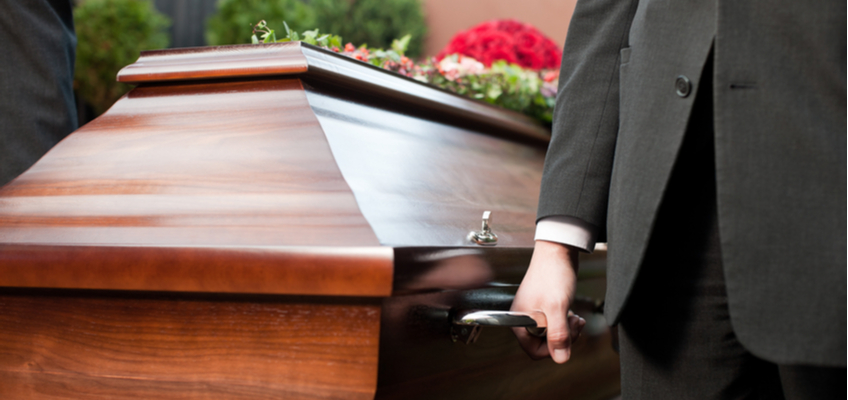Money Expert > Life Insurance > What to do when someone dies
What to do when someone dies
Last updated: 15/01/2025 | Estimated Reading Time: 6 minutes
Money Expert > Life Insurance > What to do when someone dies
Last updated: 15/01/2025 | Estimated Reading Time: 6 minutes
The death of a loved one is an incredibly emotional and difficult time, and in addition to grieving, it can be difficult to know what to do when someone dies.
This guide provides a detailed overview of what needs to be done when someone dies in the UK, outlining the steps of what to do when someone dies follow and who to contact during this challenging time.

The first step after a death is to register the death. This must be done within five days in England, Wales, and Northern Ireland (or eight days in Scotland) unless the death is referred to a coroner. The registration of death is a legal requirement, and it must be carried out at the Register Office in the area where the person died.
To register the death, you will need following information:
Once registered, you will be given a death certificate (you can request multiple copies). This official document will be needed for various administrative tasks, such as dealing with the deceased’s bank accounts, property, and any government benefits they were receiving.

If the deceased left specific instructions regarding their funeral, these should be followed.
To arrange a funeral, consider the following:
Contact a Funeral Director: A funeral director will guide you through the process and help with choosing the right type of funeral, whether it’s a burial or cremation, as well as dealing with legal requirements.
Funeral Costs: The cost of a funeral can vary, if the deceased had a prepaid funeral plan or life insurance, those funds may cover the costs. If not, the estate may be required to pay for the funeral.
Once the death has been registered and funeral arrangements are underway, it's essential to notify various authorities/government departments, organisations, and individuals about the death.
This helps stop any ongoing services and ensures that no further payments or services are being provided to the deceased. Some key service organisations to notify include:
Notify HMRC to stop tax credits, child benefits, and any other tax-related payments. If the deceased was self-employed, you will also need to inform HMRC so they can handle any final self-assessment tax returns.
Notify the deceased's bank(s) and other financial institutions, including credit card providers, insurance companies, and lenders. They will need a death certificate and banks may freeze accounts to prevent any unauthorized access.
The DWP should be notified to stop any ongoing benefits such as pensions, universal credit, or state benefits. You may also need to apply for a Bereavement Support Payment if the deceased was entitled to this.
After the death, you’ll need to deal with the deceased’s estate. If the deceased left a will, the person named as the executor is responsible for managing the estate, which in most instances includes distributing assets and paying any debts. If there is no will, the next of kin can apply for letters of administration to act as the estate's administrator.
Probate Process
Probate is the legal process through which the will is validated, and the authority is granted to the executor to carry out the deceased’s wishes. If the deceased left a will, you’ll need to apply for probate through the Probate Registry.
You can apply for probate online or via paper application. The probate process involves submitting an application, paying any applicable fees, and submitting a Grant of Probate document, which gives the executor the legal authority to manage the estate.
Letters of Administration
If the deceased did not leave a will, the process involves applying for letters of administration through the Probate Registry. The administrator (usually the next of kin) will be responsible for managing the estate and distributing the assets.
Before distributing any of the deceased's assets, you must ensure that all outstanding debts and liabilities are paid. The deceased may have had loans, credit cards, unpaid bills, or other debts.
The estate will be responsible for paying these debts using the deceased’s assets. If there is not enough money in the estate to cover all debts, the debts will need to be paid in order of priority, and some may go unpaid. This may require legal advice if there is insufficient money to cover all liabilities.
Once probate has been granted, notify other family members and creditors about the death and settle any outstanding bills. Creditors may claim from the estate, and you should ensure that you provide them with the necessary documentation and contact information.
Once all debts and taxes have been settled, the executor (if there is a will) or administrator (if there is no will) can begin distributing the estate’s assets according to the will or the rules of intestacy if there is no will.
This involves handing over the deceased’s belongings, property, and financial assets to the beneficiaries. The will should outline who gets what, but if there is no will, assets will be distributed according to the rules of intestacy.
Inheritance tax may be due on the estate if its value exceeds the nil-rate band (currently £325,000). In some cases, the estate can qualify for inheritance tax exemptions or reliefs, such as for a spouse or civil partner. A tax professional or solicitor can help determine if inheritance tax needs to be paid
If someone dies abroad, the first step is to report the death to local authorities and obtain the necessary documentation, such as a death certificate. You may need to arrange for the repatriation of the body back to the UK, which can involve high costs, or alternatively, make funeral arrangements in the foreign country.
If the deceased had assets abroad, you may need to apply for probate in both the UK and the foreign country. The UK embassy or consulate can assist with legal requirements, documentation, repatriation, passport and estate matters. It’s important to review insurance policies, such as life and travel insurance, to cover additional costs.